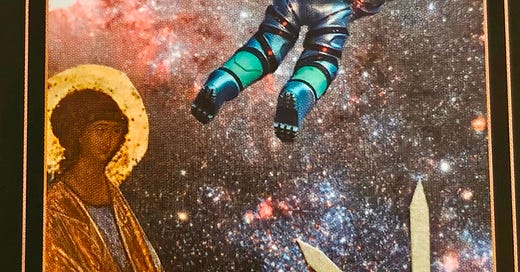Like lots of people during the COVID-19 pandemic, I got a li’l witchy. And, as it does for most employed people in a capitalist society, that meant Buying Stuff. For me, it was tarot cards: First I bought a cute girl power cartoon one; for my birthday, a dear friend bought me the small-batch deck Tarot in Pandemic and Revolution; stoned in a weird store on a hot day in Portland, I found myself led to this one (in easily one of the witchiest moments I’ve ever experienced); and most recently, for no reasons other than it was there, it the last one, and it was surprisingly effulgent, I indulged in a Buffy deck.
What do I do with all of these cards, and the handful of books I invested in to interpret them? Not much. But, without fail, on the first or second day of every month, I pull a card. I always ask some version of the same questions as I shuffle, cut, fan, and choose: How can I stay grounded this month? What can I focus on in order to grow and survive?
For November I pulled the Six of Swords which, in the Revolution deck, is a collage by by Jose Antonio Galloso depicting an astronaut flying toward a half-faced moon, the cosmos in rosy blue-black blaze around them, a glowing Madonna on the planet left behind/below. I pulled this card on the first day of the month as Election Day loomed, a card of transition and change, of leaving things behind rather than running away from them. More traditional versions of the Rider-Waite-Smith deck depict the Six of Swords as riders in a boat, at least one of the figured hunched as the open sea surrounds.
The one book I do use — every month without fail — is Michelle Tea’s Modern Tarot, and she says that this card is about making the best of a bad situation, eyes on the long-term as we navigate choppy waters. The Six of Swords encourages us to apply the powers of the intellect to protect ourselves and get ourselves out of trouble. When I pulled this card last week, I was already exhausted. Reading Tea’s words, I took tightly to heart that “the promise of [the card] is a bright and strong one: The worst is behind you. With every step forward you put distance and energy between you and whatever mistake you’re correcting or problem you’re solving.” I was already feeling so weak, so polluted: Life, the universe, and everything have been conspiring since August to knock me down every time I got up, with death and injury and more death. I was so ready for that step, that stroke of the oars, that gentle hop on up out of the atmosphere.
But now, instead, it seems the rest of the rational world is lying down here on the ground with me. It’s almost nice here, in this commiseratey cuddle puddle. It feels a little bit like when the whole world learned what the anxiety of ever-present unknowns felt like at the start of the COVID pandemic, and those of us with generalized anxiety disorder just patted the spot beside us and whispered a tremulous, “welcome.” Now I have company on the ground in the darkness, smothered in shadows and regret. But I am too tired to be welcoming, too disoriented to know where to make space beside me. So I am thinking about how to read that tarot card differently, with emphasis on the “what to leave behind” part. What can I leave behind? Social media, alcohol, the dream of the writer’s life, capitalism, liberalism, optimism, cynicism, television? What limb can I sever in order to free myself and the ones I love and the ones they love from this trap? Which of my own traps can I dismantle in order to dismantle larger systems of confinement? Which is really my version of that pandemic-era self-care trope: When the plane is plummeting, how can you put on your own oxygen mask before helping someone else put on theirs?
In the daylit space of IRL, we’re all checking in on each other, reminding our loved ones that it’s OK to grieve right now. But I was already grieving. And so when I read this today, from the TV adaptation of Isaac Asimov’s Foundation series, as quoted by David French in a NYT op-ed, I held onto it: shorten the darkness. I held onto that phrase like a collaged astronaut might hang on to their tether, a lifeline likely made of a loose braid of newspaper clippings depicting all of the other things we got done the last time the world fell apart, and the time before that and the time before that. The tether gets snapped and gets remade. The darkness doesn’t have to last as long as we might let it.



